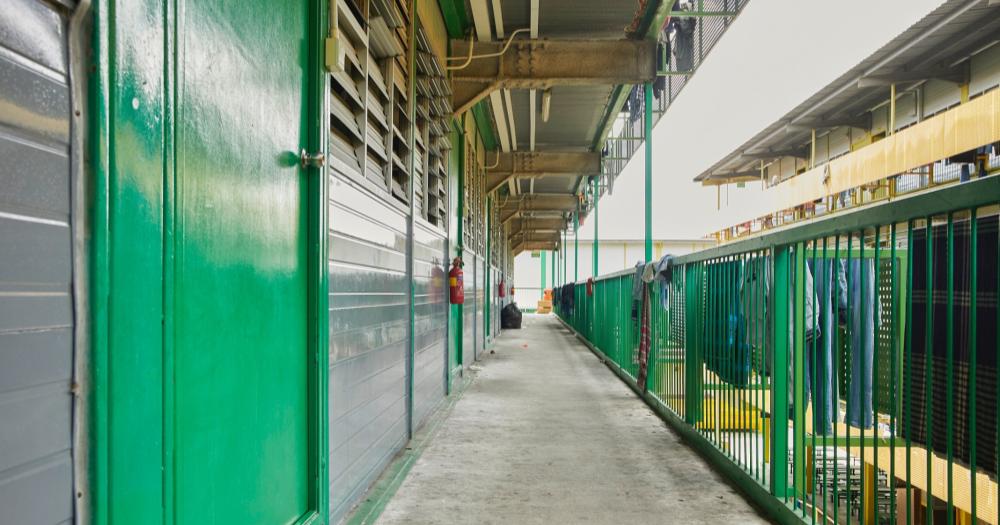Follow us on Telegram for the latest updates: https://t.me/mothershipsg
The Ministry of Manpower (MOM) said that it has adjusted health measures for workers living in dormitories in line with the healthcare protocols for the broader community.
According to a press release by MOM on Oct. 2, these new adjustments will allow MOM to focus its attention on symptomatic cases and those who need medical care, while reducing disruption to workers' lives and work.
The updates to the health measures include more focused contact tracing, shorter quarantine periods, and updated isolation requirements for asymptomatic positive cases, as well as more convenient testing.
1. Contact tracing to be focused on those most at risk, shorter quarantine
Previously, entire blocks or sections within blocks would be quarantined as a precautionary measure when new cases are detected in dormitories.
Now, MOM said, contact tracing would be tightened, so that it focuses on those who are "most at risk of being exposed to the virus".
Quarantine orders (QO) will only be issued to roommates of those who are confirmed to be Covid-19 cases via a PCR test.
The quarantine period will also be reduced from 14 days to 10 days from the date of last exposure to the confirmed case, with workers to self-administer ART from Day 11 to Day 14.
As for other residents in the dormitory who are close contacts of a PCR positive resident, MOM said that they may be issued with either a Health Risk Warning (HRW) or Health Risk Alert (HRA) via TraceTogether (TT) and follow MOH’s prevailing protocol.
The revised policy for QOs will reduce the extent and duration of work disruptions while protecting public health, MOM said.
However, MOM said that wider quarantine rings "may still be applied" if there are new large clusters, to contain the spread of Covid-19.
2. Isolation requirements for asymptomatic Covid-19 cases among workers
MOM also updated the isolation requirements for Covid-19 cases among workers, saying that those who were fully vaccinated and asymptomatic, but tested positive for Covid-19, would be able to isolate and recover in a dedicated facility within their dormitories for up to 10 days.
They would be given access to thermometers, oximeters for monitoring and telemedicine support.
Workers will be required to take an ART test after Day 3 and will be discharged upon receiving a negative ART result.
The updated isolation requirement for workers in dormitories is similar to a new self-isolation regime announced by the Multi-Ministry Taskforce (MTF) last month, in which members of the public who test positive via ART but are asymptomatic can self-isolate and consider themselves recovered if they test negative at the end of 72 hours.
As for workers who have symptoms, they will be given a confirmatory PCR test and conveyed to community care facilities (CCF) or hospitals depending on their condition.
MOM said that this will ensure better prioritisation of healthcare capacity for treating serious cases, as well as for other healthcare needs.
This also lines up with updated guidance to members of the public from the Ministry of Health since mid-September.
3. More convenient testing
MOM said that it will increase the use of Fast and Easy Tests such as Antigen Rapid Tests (ARTs) to make testing in dormitories more convenient.
Regular testing remains the cornerstone of our efforts to detect and isolate cases early, said MOM.
MOM said that it has introduced regular ART for workers on top of their regular Rostered Routine Testing (RRT) cycles from Sep. 13.
Moving forward, however, MOM will "progressively shift" towards the use of only ART tests for RRT.
Dormitory residents with acute respiratory illness (ARI) symptoms should continue to report sick at one of the regional medical centres and a polymerase chain reaction (PCR) test will be administered if clinically indicated, MOM said.
Infected workers largely asymptomatic, none in ICU
There continues to be strong evidence that fully vaccinated individuals are protected against severe illness, said MOM.
MOM added that 97 per cent of the infected migrant workers had no symptoms.
As for the remaining 3 per cent who experienced symptoms, most were mild and "a handful" were sent to the hospital or community care facilities.
None of them were in the Intensive Care Unit (ICU) and only one of them needed oxygen supplementation, said MOM.
"This is expected, given that the overwhelming majority of migrant workers are generally young," the ministry added.
Top photo via MOM
Follow and listen to our podcast here
If you like what you read, follow us on Facebook, Instagram, Twitter and Telegram to get the latest updates.
